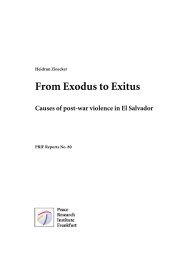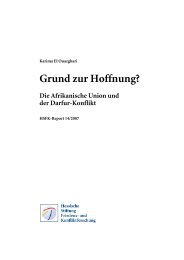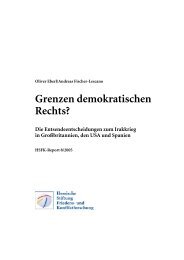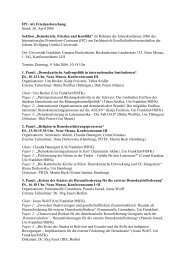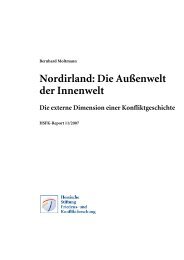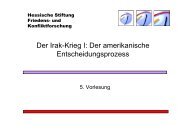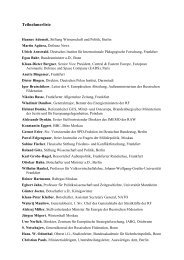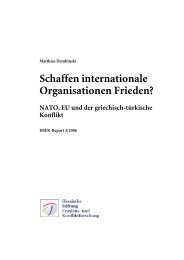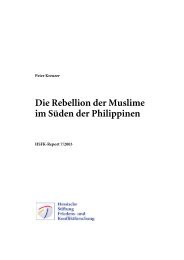The Normative Construction of the Military in Lithuania - HSFK
The Normative Construction of the Military in Lithuania - HSFK
The Normative Construction of the Military in Lithuania - HSFK
You also want an ePaper? Increase the reach of your titles
YUMPU automatically turns print PDFs into web optimized ePapers that Google loves.
M<strong>in</strong>iotaite: <strong>Lithuania</strong>n Case I/14-2007<br />
<strong>The</strong> constitution calls for one year <strong>of</strong> compulsory military tra<strong>in</strong><strong>in</strong>g or alternative<br />
service. <strong>The</strong> 139 article <strong>of</strong> <strong>the</strong> constitutions states: “<strong>The</strong> defence <strong>of</strong> <strong>the</strong> state <strong>of</strong> <strong>Lithuania</strong><br />
from foreign armed attack shall be <strong>the</strong> right and duty <strong>of</strong> every Citizen <strong>of</strong> <strong>the</strong> republic <strong>of</strong><br />
<strong>Lithuania</strong>”. Citizens “are obliged to serve <strong>in</strong> <strong>the</strong> national defence service or to perform<br />
alternative service <strong>in</strong> <strong>the</strong> manner established by law“.<br />
2.2. <strong>The</strong> Basics <strong>of</strong> National Security <strong>of</strong> <strong>Lithuania</strong> 1996<br />
<strong>Lithuania</strong>’s political life <strong>of</strong>fers ample material for <strong>the</strong> analysis <strong>of</strong> different<br />
conceptualizations <strong>of</strong> security and defense. In <strong>the</strong> period between <strong>the</strong> declaration <strong>of</strong><br />
<strong>Lithuania</strong>’s <strong>in</strong>dependence <strong>in</strong> 1990 and <strong>the</strong> enactment <strong>of</strong> <strong>the</strong> ma<strong>in</strong> document def<strong>in</strong><strong>in</strong>g<br />
<strong>Lithuania</strong>’s security and defense policies at least four o<strong>the</strong>r drafts <strong>of</strong> <strong>the</strong> security<br />
conception were widely discussed. <strong>The</strong> Basics <strong>of</strong> National Security <strong>of</strong> <strong>Lithuania</strong> (BNSL)<br />
that was adopted by Seimas (<strong>Lithuania</strong>’s Parliament) <strong>in</strong> December 1996 was prepared by<br />
a task group created at <strong>the</strong> end <strong>of</strong> 1994. <strong>The</strong> group consisted <strong>of</strong> representatives from all<br />
<strong>the</strong> parties hav<strong>in</strong>g seats <strong>in</strong> Seimas, so that <strong>the</strong> f<strong>in</strong>al document was fairly expressive <strong>of</strong> <strong>the</strong><br />
common attitude <strong>of</strong> <strong>Lithuania</strong>’s political elite towards issues <strong>of</strong> national security.<br />
<strong>The</strong> document is not entirely consistent. On <strong>the</strong> one hand, it manifests <strong>the</strong><br />
tendency towards <strong>the</strong> securitization <strong>of</strong> <strong>the</strong> geopolitical environment. On <strong>the</strong> o<strong>the</strong>r hand, it<br />
also reflects <strong>the</strong> fact that <strong>in</strong> <strong>the</strong> period between <strong>the</strong> first draft <strong>of</strong> <strong>the</strong> law and <strong>the</strong><br />
document’s adoption as law <strong>Lithuania</strong>’s foreign and security policy acquired a dist<strong>in</strong>ctly<br />
pro-Western orientation. <strong>The</strong> most prom<strong>in</strong>ent feature <strong>of</strong> <strong>the</strong> document is <strong>the</strong> partition <strong>of</strong><br />
<strong>the</strong> security space <strong>in</strong>to <strong>the</strong> zone <strong>of</strong> peace and <strong>the</strong> zone <strong>of</strong> potential conflict. Membership<br />
<strong>in</strong> EU, NATO and WEU is seen as <strong>the</strong> ma<strong>in</strong> means <strong>of</strong> ensur<strong>in</strong>g <strong>Lithuania</strong>’s security and<br />
<strong>the</strong> country’s habitation <strong>in</strong> <strong>the</strong> zone <strong>of</strong> peace.<br />
Security is conceived as <strong>the</strong> preservation <strong>of</strong> <strong>the</strong> permanent and unchang<strong>in</strong>g entity<br />
(<strong>the</strong> nation-state) by discover<strong>in</strong>g <strong>the</strong> threats it faces and neutraliz<strong>in</strong>g <strong>the</strong>m by political and<br />
military means. <strong>The</strong> document shows that <strong>Lithuania</strong>’s security concept <strong>in</strong> early 1990s was<br />
based on <strong>the</strong> neo-realist assumption that <strong>the</strong> state’s priorities and threats can be easily and<br />
unambiguously def<strong>in</strong>ed and that <strong>the</strong>y rema<strong>in</strong> <strong>the</strong> same despite <strong>in</strong>teractions with o<strong>the</strong>r<br />
states and o<strong>the</strong>r <strong>in</strong>stitutional dynamics. Security thus conceived <strong>in</strong>cites enmity <strong>in</strong> foreign<br />
policy and lays <strong>the</strong> grounds for <strong>the</strong> practice <strong>of</strong> securitization <strong>in</strong> domestic policy. This<br />
conception <strong>of</strong> security, exploit<strong>in</strong>g <strong>the</strong> image <strong>of</strong> unpredictable Russia, saw <strong>Lithuania</strong>’s<br />
<strong>in</strong>tegration with NATO and EU as grounded ma<strong>in</strong>ly on <strong>the</strong> needs <strong>of</strong> national security.<br />
<strong>The</strong> document reveals <strong>the</strong> tension present <strong>in</strong> <strong>Lithuania</strong>’s political life, namely that<br />
between an orientation towards <strong>the</strong> nation-state <strong>in</strong> domestic policies but <strong>in</strong>tegration with<br />
<strong>the</strong> West <strong>in</strong> foreign policy. <strong>The</strong> former orientation is <strong>the</strong> dom<strong>in</strong>ant one, expressive <strong>of</strong> <strong>the</strong><br />
political discourse prevail<strong>in</strong>g <strong>in</strong> 1992-95. This is particularly evident <strong>in</strong> <strong>the</strong> conception <strong>of</strong><br />
defense as based on <strong>the</strong> pr<strong>in</strong>ciple <strong>of</strong> total and unconditional defense:<br />
“Total defense means that <strong>Lithuania</strong> shall be defended with arms by <strong>the</strong> armed<br />
forces, that all <strong>the</strong> resources <strong>of</strong> <strong>the</strong> state shall be employed <strong>in</strong> <strong>the</strong> defense effort<br />
and that each citizen and <strong>the</strong> nation shall <strong>of</strong>fer resistance by all means possible<br />
(my emphasis, G.M.). Unconditional defense means that defense <strong>of</strong> <strong>Lithuania</strong><br />
9



